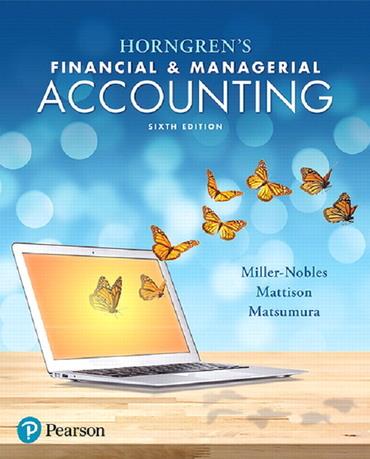Question
Management Please help 35. A limitation of transfer prices based on actual cost is that they B a. Charge inefficiencies to the department that is
Management
Please help
35. A limitation of transfer prices based on actual cost is that they
B a. Charge inefficiencies to the department that is transferring the goods
b. Can lead to suboptimal decisions for the company as a whole
c. Must be adjusted by some markup
d. Lack clarity and administrative convenience
36. Negotiated price is often employed when
B a. Market prices are stable c. Goal congruence is not a major objective
b. Market prices are volatile d. Market prices change by a constant rate each year
37. The AAA Division of a company, which is operating at capacity, produces and sells 1,000 units of a certain electronic
component in a perfectly competitive market. Revenue and cost data are as follows:
Sales: P 50,000
Fixed costs: P 12,000
Variable costs: P 34,000
What is the minimum transfer price that should be charged to the BBB Division for each component?
D a. P 12.00 c. P 46.00
b. P 34.00 d. P 50.00
38. Division A of company is currently operating at 50% capacity. It produces a single product and sells all its production to
outside customers for P 13 per unit. Variable costs are P 7 per unit, and fixed costs are P 6 per unit at the current
production level. Division B, which currently purchases this product from an outside supplier for P 12 per unit, would like
to purchase the product from Division A. Division A will operate at 80% capacity to meet outside customer's and Division
B's demand. What is the minimum price that Division A should charge Division B?
A a. P 7.00 per unit c. P 12.00 per unit
b. P 10.40 per unit d. P 13.00 per unit
39. An appropriate transfer price between two divisions of the Emerald Co. can be determined from the following data:
Fabricating Division:
Market price of sub-assembly P 50
Variable cost of sub-assembly P 20
Excess capacity 1,000
Assembling Division:
Number of items needed 900
What is the natural bargaining range for the two divisions?
A a. Between P 20 and P 50 c. Any amount less than P 50
b. Between P 50 and P 70 d. P 50 is the only acceptable price
40. The 1st division of Gold Company produces Part I that is to be used by Gold as a key part in its products. Costs and sales
data on Part I are as follows:
Selling price per unit: P 100
Variable cost per unit: P 60
Fixed cost per unit: P 24 (based on 40,000 units capacity per annum)
Gold's 2nd division is introducing a new product that will use Part I. An outside supplier has quoted 2nd division a price
of P 96 per unit. This represents the usual P 100 price less a quantity discount due to the large number of 2nd
division's requirement. If the 2nd division would buy 15,000 units of Part I from the 1st division, the effect on the
corporate-profits would be:
D a. Increase by P 240,000 c. Increase by P 210,000
b. Increase by P 1,500,000 d. Reduce by P 60,000
Step by Step Solution
There are 3 Steps involved in it
Step: 1

Get Instant Access to Expert-Tailored Solutions
See step-by-step solutions with expert insights and AI powered tools for academic success
Step: 2

Step: 3

Ace Your Homework with AI
Get the answers you need in no time with our AI-driven, step-by-step assistance
Get Started


